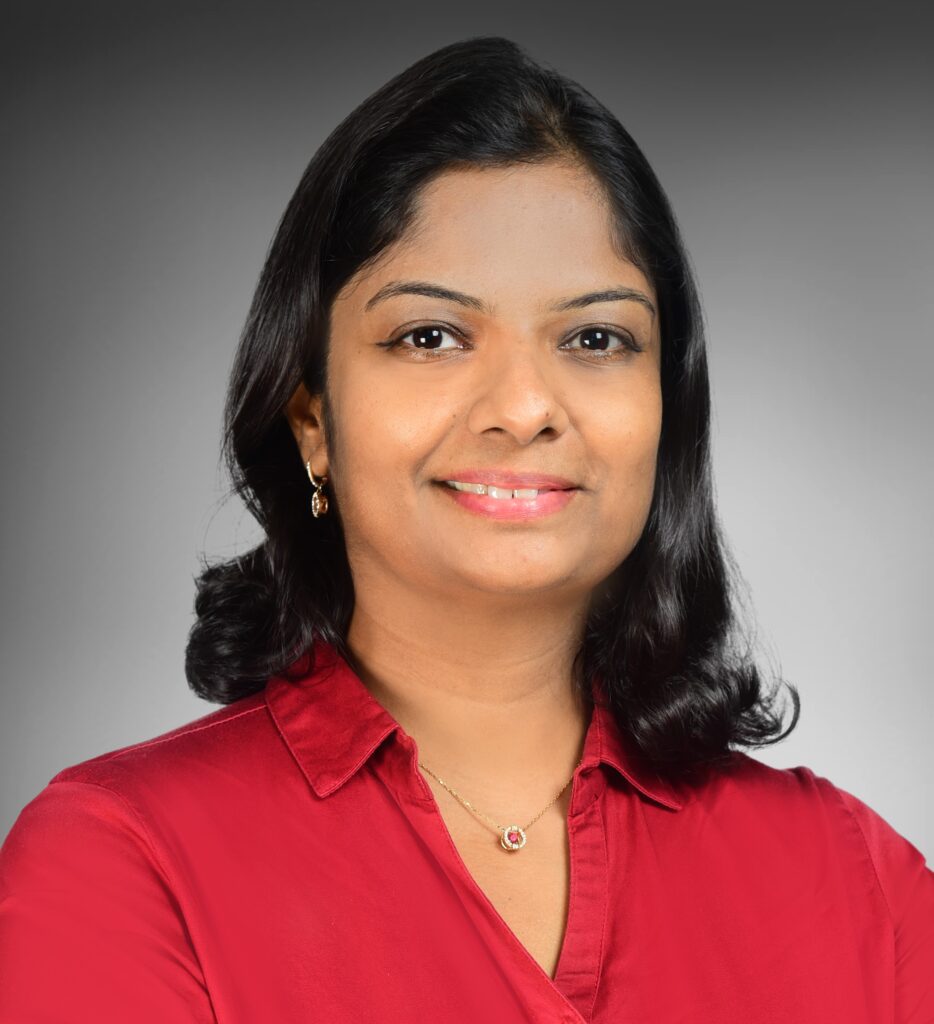June 21, 2023

Dhanya Dharmapalan, MD, is a Consultant in Pediatric Infectious Diseases at Apollo Hospitals, Navi Mumbai, India. She is the National Coordinator of the Apollo Antimicrobial Stewardship Programme for over 70 Apollo hospitals. Dr. Dharmapalan earned her medical degree from University of Pune, India, then pursued a postgraduate diploma degree in pediatric infectious diseases from University of Oxford. She received Apollo Hospitals’ Young Academician award and was honored by the Indian Academy of Paediatrics (IAP) as a Fellow in 2019. She is the chair of the AMR Working Group of the International Pediatric Association and currently serves on the Pediatric Committee on Antimicrobial Stewardship.
Why pediatric ID? A career in pediatric infectious diseases was not a momentous decision but a path that I feel I was destined to walk on. I hail from a developing country. While India has an active healthcare system, it also has a huge burden and wide variety of infectious diseases. While working in a multi-specialty pediatric healthcare setting, I developed an interest in pediatric infectious diseases. During this period, I became involved as the desk Editor of the journal Paediatric Infectious Disease, an official publication of the Infectious Disease Chapter of the IAP. This allowed me an opportunity to closely follow the developments in infectious diseases and my interests only grew deeper.
Despite the enormous burden of infectious diseases on child health, there was no formal training exclusively in pediatric infectious diseases in India available in those days. I sought training in pediatric infectious diseases from the University of Oxford. My dissertation during the course, mentored by Professor Mike Sharland, a global expert in the field of antimicrobial resistance (AMR), was published as a comprehensive review of AMR patterns of blood culture isolates of Indian children and neonates with bacterial sepsis. I continued to do clinical work learning judicious antibiotic use from Dr. Vijay Yewale, who was elected IAP President in 2014. Working with him lead to my involvement in various IAP training modules on rational antibiotic practices as a writing member and national trainer for pediatricians. I also formed a long-term association with the late Dr. A. Parthasarathy with whom I served as an editor on over 15 pediatric textbooks.
My opportunity to work with Professor T. Jacob John, an eminent virologist, and global polio expert, took my understanding of pediatric infectious diseases to a different level. I learned the importance of rational and constructive thinking on public health issues. I joined him in the quest of finding solutions for the faltering global polio eradication program and in 2020 co-authored the book “Polio: The Eradication Imbroglio. The Malady and its Remedy”.
Where have you taken your ID focus? Pediatric infectious diseases is not well recognized as a specialty in India. The role of ID specialist is presently limited to complex, unusual, and extensively drug-resistant infections. But these cases make one work like a detective to identify the causative bug and it is very satisfying to help solve these infection-related mysteries. Based on my years of work in AMR and rational antibiotic practices, Apollo Hospitals appointed me to design and implement an antimicrobial stewardship programme in over 70 Apollo hospitals across India for adults and children. This work is extremely challenging and is well supported by the leadership at Apollo.
I have also accepted an invitation to serve as the Chair of the AMR Working Group of the International Pediatric Association (IPA) for 2023-25. IPA has membership in over 140 countries and is another exciting opportunity to make a worthy impact in this field.
I also continue working with polio and problems in polio eradication.
What is a recent development in peds ID you are working on? My journey in the field of AMR started with the publication in JPIDS of our review of AMR patterns Indian neonates and children, which became a major milestone in my career. There was a paucity of published data in pediatric AMR from India and that publication received attention from the World Health Organisation, which highlighted it as the Editor’s choice in its newsletter and was cited in the National Scoping Report on AMR by the Government of India. The research also received considerable media coverage on the front page of a leading Indian newspaper. I realized the powerful impact of good research through this paper.
I also led the outbreak investigation of group A pharyngitis in children which resulted in the first genomic data on streptococcus pyogenes from western India in the public domain. Similarly, an outbreak investigation of hand foot and mouth disease (HFMD) could provide answers to the clinical question of repeat episodes of HFMD in the same child in a few weeks as well as atypical clinical features of the infection. I would also highlight the correspondence in the Lancet about the challenges in the eradication of polio and the lessons derived from polio detected in New York in the journal Vaccines.
What do you enjoy most about being a PIDS member? What keeps you renewing your membership? I became a member of PIDS in 2016. I have been fortunate to interact with several leading experts in pediatric ID and it has been very inspiring to know about the work that they carry out in this field. I got the fantastic opportunity to co-lead the global health subcommittee with Dr. Lee Morris. Despite being from another country, I felt like a valued PIDS member. The members during the meetings are always open to new ideas and very respectful of each other’s opinions. The PIDS staff members are also very friendly and efficient. Apart from the wealth of knowledge from the webinars which are always the latest and most updated, the association with PIDS has also helped me discover wonderful friends. I thoroughly enjoy my association with PIDS, which has been a very humbling experience and would certainly want to renew my membership every year.